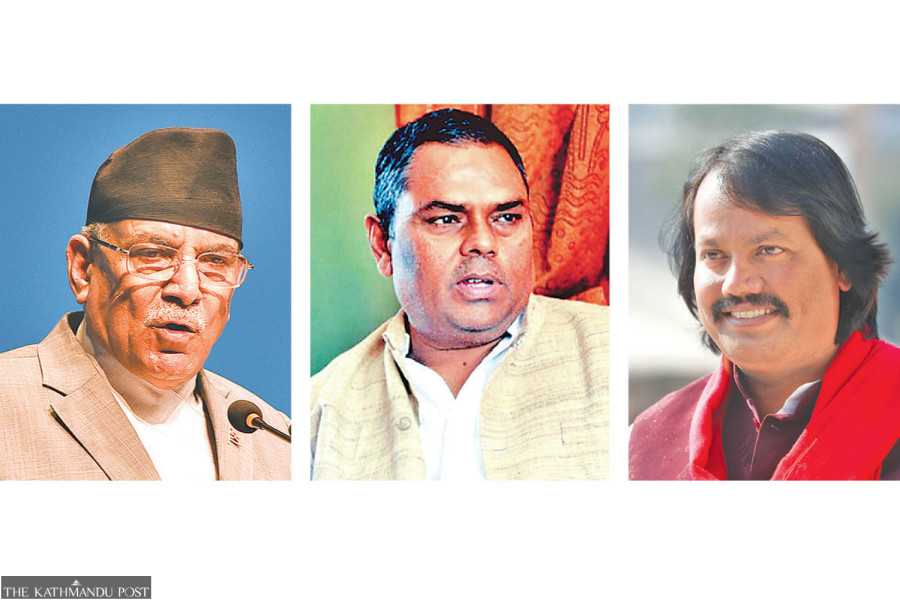Politics
PM wants Janamat Party in Cabinet despite rival parties’ reservation
Prime Minister Pushpa Kamal Dahal is ready to allocate one ministry to the Janamat Party, said its general secretary Chandan Singh.
Nishan Khatiwada
Prime Minister Pushpa Kamal Dahal has been preparing to welcome Janamat Party in his government through a reshuffle of the current Council of Ministers.
On Sunday, the prime minister met with Janamat chair CK Raut and urged him to join the government, sources said. Dahal is ready to allocate one ministry to the Janamat Party, said Janamat Party General Secretary Chandan Singh.
“But we have some conditions,” Singh said. “We are seeking one ministry—either the Urban Development or Industry or the Agriculture ministry.”
Singh added that the allocation of a ministry for its minister without portfolio in the Madhesh government is also among their demands.
Expanding his Cabinet for a third time in May, Chief Minister Saroj Kumar Yadav stripped Basanta Kushwaha of the Janamat Party of his portfolio, replacing him with the Unified Socialist’s Govinda Bahadur Neupane as the minister for land management, agriculture, and cooperatives.
Three Madhesh-based parties made it to the House of Representatives following last year’s general polls. However, the relations between the regional rival forces have been cold—especially between the Janamat Party and the Janata Samajbadi Party, as both of them sense each other as major obstacles to holding sway in Madhesh politics. Yet the leaders of the Janata Samajbadi and Loktantrik Samajbadi Party have claimed that they were okay with Janamat joining the federal government.
Surendra Jha, a Loktantrik Samajbadi Party leader close to Mahantha Thakur, said as the Janamat Party is a part of the coalition, giving it one ministry would not be so complicated.
Insiders say the prime minister has been trying to bring the Janamat Party into the government given the volatile political situation and the tricky parliamentary arithmetic. Last week, while passing the appropriation bill from the lower house, 107 voted against the budget and 147 voted in its favour. As many as 138 votes were required to endorse the bill. Some ruling coalition partners had expressed their displeasure after the budget for the fiscal year 2023-2024 was announced.
“Yes, there are flaws in Janamat’s decision making but given the current political circumstances, it is better to induct the party in the government,” Jha said.
Janata Samajbadi Party spokesperson Manish Suman said the party will not be engaged in the politics of negation. “If the prime minister believes the government will be better served by bringing in Janamat, we are okay with it.”
Suman, however, added that the Janamat has repeatedly been flouting the norms and the discipline of the coalition—during the vice-presidential elections and bypolls in Bara. They had also voted against the appropriation bill in the House of Representatives on June 28.
In the election for Vice President in March, Raut’s Janamat Party had fielded its own candidate, Mamata Jha, for the post against Janata Samajbadi Party’s Ramsahay Prasad Yadav. Janamat and Janata Samajbadi Party’s bitter rivalry was evident also during the Bara bypoll held in April, when Upendra Yadav was in the race.
“If coalition partners do not abide by discipline, there will be no future of the coalition,” Suman said. “Our party is not happy with the Janamat’s recent activities but we will not engage in the politics of negation.”
Janamat Party quit the federal government on March 31, having been denied a ministerial berth of its choice. The party’s minister, Abdul Khan, submitted his resignation after the Ministry of Industry that his party was laying its claims to was given to the Nepali Congress.
Currently, the Nepali Congress is leading nine ministries in the Cabinet, while the CPN (Maoist Centre) leads six ministries and has one minister of state, besides the prime minister. The CPN (Unified Socialist) leads two ministries along with one minister of state. The Janata Samajbadi is in charge of two ministries and has one of its leaders as state minister, while the Loktantrik Samajbadi Party and Nagarik Unmukti Party lead one ministry each.
Leaving the traditional parties flabbergasted, the CK Raut-led Janamat Party, in its maiden parliamentary election, got six seats and became a national party. Moreover, party chair CK Raut trounced Janata Samajbadi chief Upendra Yadav with a sizable margin of votes in Saptari. People have been seeing it as a strongly emerging political force in Madhesh with a huge potential. Despite that, however, the party has been failing to forge a concrete roadmap and is in a dilemma on whether to govern or remain in the opposition.
“CK Raut and his party are confused regarding the track they should be walking on—whether to join the government or remain in opposition,” said Chandra Kishore, a political commentator. “Sometimes, they claim to be a vital part of power-sharing and challenge Yadav but they are unclear on how they would differ from the traditional Madhesh-based parties.”
Kishore said that the Janamat Party should stay in the opposition and be a vocal advocate of Madhesh issues and agendas. “For that, they should have clarity on the Madhesh issues, show commitment, and have a clear concept, which they currently lack,” he said. “That’s not a good sign for an ascendant political force.”




 18.12°C Kathmandu
18.12°C Kathmandu















